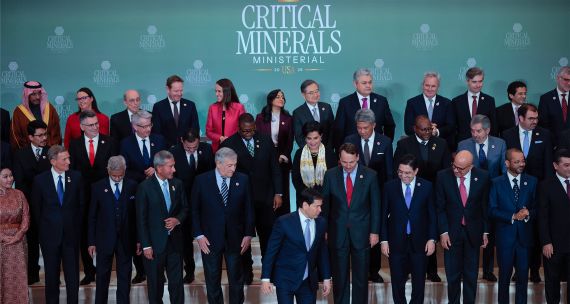The Takeaway
A June 20 report by the South Korean Ministry of Economy and Finance (MEF) revealed that despite an overall decline in South Korea’s direct investment abroad in the first quarter of 2023, South Korean investment in Canada surged by 62.1 per cent compared to the same period in 2022, hitting C$1.41 billion. This shift suggests a strategic move by South Korean firms towards diversifying their overseas portfolios and underscores Canada's increasing prominence as an investment destination.
In Brief
Canada and South Korea have conducted numerous diplomatic exchanges in 2023 to mark 60 years of diplomatic relations, with the 60th anniversary following the release of both countries' Indo-Pacific strategies in 2022.
In Q1 of 2023, Canada ranked second in the world in terms of South Korean net investment, trailing only the U.S. This development indicates strengthened economic ties and bilateral relations. After Prime Minister Justin Trudeau's Seoul visit preceding the Group of Seven meeting in Hiroshima in May, Canada and South Korea expanded co-operation in critical mineral supply chains and the clean energy sector, alongside a joint pursuit of shared values. Some key initiatives include:
-
In May, POSCO Future M Co., a South Korean battery material manufacturer, and General Motors, a U.S. automobile manufacturer, announced a joint venture to build a cathode manufacturing facility in Quebec valued at C$859 million. The investment will promote growth in the automotive sector for Canada and help position the country as a global electric-vehicle (EV) supply chain leader.
-
In June, SK ecoplant, a South Korean renewable energy company, committed C$6 billion to the Nujio’qonik Project, which is a Canadian commercial green hydrogen plant facilitated by a Newfoundland and Labrador-based renewable energy company, World Energy GH2.
-
In July, LG Energy Solution, a prominent South Korean leader in lithium-ion batteries and energy storage solutions, and Stellantis, a multinational automotive company, pledged to establish an EV battery manufacturing plant in Ontario through a C$4.9-billion venture called NextStar Energy. This project highlights Canada and South Korea’s commitment to advancing battery technology and production capabilities in the region, while also creating 2,500 jobs in Canada.
-
The same month, construction and engineering firm Samsung C&T signed a C$10.1-million agreement with CarbonCure Technologies Inc., a Canadian company specializing in low-carbon concrete technology, to collaborate on decarbonizing the construction industry in South Korea.
These initiatives emphasize both countries’ commitment to advancing battery technology, aligning with Canada’s net-zero aspirations. Despite global uncertainties, South Korea’s active engagement in Canadian industries indicates Canada’s appeal, with the possibility of further investments coming to Canada’s health-care industry, among other sectors.
Implications
The Canada-Korea Free Trade Agreement (CKFTA), which entered into force in 2015, significantly expanded Canada and South Korea’s economic ties. The CKFTA, Canada’s first and only bilateral free trade agreement with an Asian country, aims to enhance trade and investment by reducing tariffs and barriers to market access. Since the election of President Yoon Suk Yeol in May 2022, the government has proactively promoted South Korea on the global stage. This has had positive spillover effects, driving increased investment from South Korea into Canada and diversifying bilateral trade.
Yoon, the self-proclaimed "no. 1 salesman of the Republic of Korea," has championed South Korean businesses, encouraging them to pursue sustainable growth through technological innovations within the private sector. This aligns with the Yoon administration’s foreign policy vision that is centred around making South Korea a "global pivotal state" by collaborating with partners to elevate the country's global significance. The new strategy complements South Korea’s trade interests, aiming to bolster its global relevance and expand economic co-operation with countries like Canada.
Canada now has the opportunity to reciprocate by presenting specific proposals for partnerships, collaborations, and investments in South Korea.
What's Next
-
MoU on clean energy, critical minerals
In May, during their meeting in Seoul, Trudeau and Yoon signed a memorandum of understanding (MoU) on collaboration in critical mineral supply chains, the clean energy transition, and energy security. The MoU solidifies both countries' involvement in the critical mineral supply chain and — thanks to a shared commitment of reaching net-zero emissions by 2050 and joint efforts to advance cleantech — will bring them closer together in the years ahead.
-
Teaming up on cleantech
On July 18, a South Korean liquefied petroleum gas distributor, E1 Corporation, announced an investment of C$10 million into a Canadian blue ammonia production project. The project, in collaboration with Hydrogen Canada, aims to produce environmentally friendly ammonia from natural gas in Alberta, using carbon dioxide capture and storage technology. This development deepens Canada's role in the global clean energy transition and could prompt future collaborations in tackling climate change.
-
Forging health-care funding partnerships
On July 4, a South Korean venture capital firm and the Ontario government formed a partnership to boost biopharma startups from both regions and leverage growth opportunities in health care. This trend of subnational entities engaging in international investments may grow, with Ontario providing South Korean firms strategic access to the U.S., and Ontario-based companies gaining increased entry to Asian markets through South Korea.
• Produced by CAST’s Northeast Asia team: Dr. Scott Harrison (Senior Program Manager); Momo Sakudo (Analyst); Tae Yeon Eom (Analyst); and Sue Jeong (Analyst).




